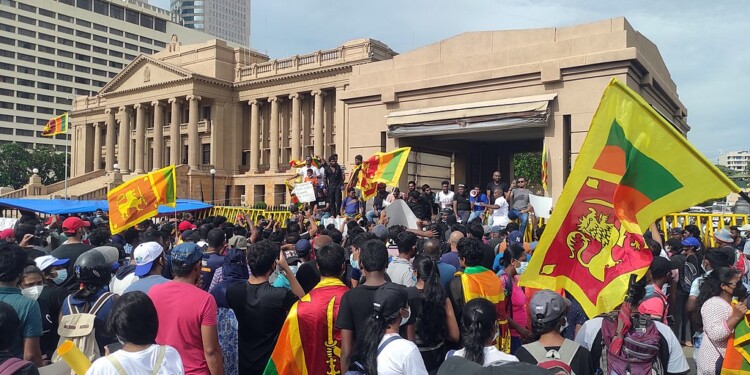Sri Lanka has surrendered. It’s default.
The government has announced it will focus spending on importing essential commodities like food or fuel. Settlement of external debt will be delayed. Officials declared that continuing to repay the debt is not a sustainable policy, even though strenuous effort was undertaken to respect all external financial obligations.
The decision is far from being unexpected. Reuters reports that BlueBay Asset management’s senior emerging markets sovereign strategist, Timothy Ash, declared: “the only surprise is that it took the administration in Colombo so long to come to terms with the reality on the ground.”
But the government’s behavior is understandable. Yet declaring default amounts to an unequivocal admission of incapacity to manage the state. As Impakter already analyzed, the leading cause of this financial crisis is Sri Lanka’s reckless economic policy. It’s only logical that the government tried to make it less evident.
The government engaged in many inconsiderate investment plans, like the Hambantota port deal, whose cumulative effect caused a shortage in foreign currency reserves. Such reserves were both used to pay off the sovereign debt and the regular spending on essential commodities.
Sri Lanka is deeply reliant on imports and, therefore, increasing the debt burden was hugely detrimental to the country’s future. As soon as a significant economic shock happened (as debt continued to grow) the economy would collapse.
And then covid hit.
So it is too simplistic to consider the current default as a consequence of unfortunate occurrences, as Sri Lanka’s finance minister tried to hint at in a statement where he declared that the pandemic, coupled with the war in Ukraine, made it impossible to pay creditors. Such a statement is not wrong per se, but it’s an attempt at diverting responsibility from the government to some ex Machina market fallacies, and in that sense, it is entirely incorrect.
Related Articles: Crisis in Sri Lanka: Feed the People or Declare Default? | China’s Debt-Trap Diplomacy |
On Monday, Sri Lanka is due to pay 78 million dollars as interest payments on its international sovereign bonds. There is a 30-day grace period after that date, but if the payment is not completed within then, Sri Lanka will find itself in its first default on foreign debt since its independence from the UK in 1948.
The government has called for patience from its population, and encouraged Sri Lankan nationals working abroad to send money into the country. The IMF restructuring of the debt, along with the default, is now a virtual certainty. It will imply that the country’s economic policies will be closely monitored to make sure the intervention is effective.
This fact, however, does not imply a complete revision of the country’s leadership. Gotabaya and Mahinda Rajapaksa, the country’s president and prime minister, are holding firm on power, even if protests demanding their resignation don’t seem to thin out.
“This protest will not end until this government is brought down. We will stay here for months, years. It is not about a single-family but the entire corrupt system,”
Anonymous demonstrator, reported by ANI news
One has to hope these words are true, and that the population will not settle for a cheap buy-out from the government as the economic situation will improve after the IMF involvement. The Rajapaksa family and the system it represents, will only require a few years to compromise the situation again.
Many will disagree, but any authoritarian leader doesn’t care about his people’s prosperity. Or in any case not more than his own.
Sri Lanka remains deeply embedded in its worst crisis since independence, and the prospects are dire on all fronts. However, if one looks at the situation from a different perspective, sucht crises are tragedies as much as they are opportunities.
That’s because crises involve change, and if that change is aimed in the right direction, it can lead to a better future.
Etymology is often useful for fancy dinner small talk, but on other occasions, it is a revealing discipline. Looking at the origin of words can unveil an overlooked dimension of meaning, an elusive shade of its essence and, ultimately, a different way to look at reality.
If one were to check for the original meaning of “crisis” or Krisis in ancient Greek, one would discover it’s not associated with an inherently negative connotation: it refers to the decisive moment in a state of things. The point at which change must come, for better or worse.
The Sri Lankan people need to stay in the streets if they want the original meaning of the word crisis, i.e. a radical change in their lives, to happen.
Editor’s Note: The opinions expressed here by Impakter.com columnists are their own, not those of Impakter.com. — In the Featured Photo: Anti-government protest in Sri Lanka, 13 April 2022. Featured Photo Credit: Wikimedia Commons.










